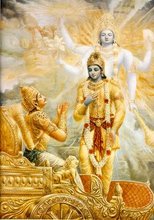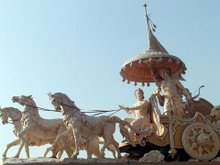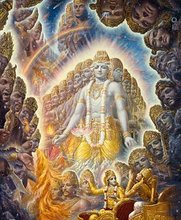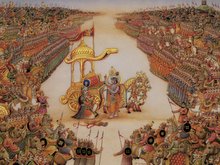The Bhagavad Gita, the “Song of the Divine One”, is a Sanskrit text from the Mahabharata. The Gita consists of 700 versus, and is spoken mainly by Krishna, who is explaining the purpose of life to Arjuna. The main goal of one’s life is to attain enlightenment, knowledge of the universe. Essentially, God is infinite, and everything and everyone is a part of his energy. One must realize this, and devote himself to worshipping and serving God.
Right before the beginning of the Mahabharata War, Arjuna suddenly refuses to participate in the battle, realizing that the “enemies” he would be fighting against are in fact his friends and relatives. In the Bhagavad Gita, Krishna is attempting to persuade Arjuna of the justness and necessity of the war. He needs to convince Arjuna to fight, since they cannot win without him. Krishna tells Arjuna that he should fight in battle without guilt; the soul is eternal and cannot be destroyed; it never loses its being. “It is not killed when the body is killed… the embodied self discards its worn-out bodies to take on other new ones.” The body is merely a temporary housing for the soul; it is part of the ephemeral material world. When people are killed in war, their souls do not change, only their bodies do. God’s energy and the soul are infinite. Therefore, Arjuna should not feel bad about fighting against these people he was once close to. “Learned men do not grieve for the dead or the living. Never have I not existed… never in the future shall we cease to exist.”
Krishna is very eager for the Mahabharata war to occur. Apparently, the war is critical to restore the proper balance in the universe’s order. Arjuna’s refusal to fight is standing in the way of achieving this, and the purpose of the Bhagavad Gita speech is to enlighten Arjuna with the truth so he will understand the essentialness of the war. Krishna claims it is Arjuna’s “sacred duty” to fight, and that if he doesn’t participate, the truth would be obscured and the cosmos would fall out of balance. He says, “Nothing is better for a warrior than a battle of sacred duty. If you fail to wage this war of sacred duty, you will abandon your own duty… People will tell of your undying shame.” Krishna justifies the horrifying aspects of the upcoming war by calling it a “battle of sacred duty” and a righteous war that will establish justice and righteousness.
In this famous scene of the Mahabharata, Krishna also reveals himself as the Supreme God Vishnu to Arjuna. Furthermore, Krishna explains that he occasionally descends to Earth in human form in order to restore dharma, to establish and protect righteousness in the world and to destroy unrighteousness. This time, he was incarnated in a human body to eliminate evil kings (the Kauravas).
However, the Gita goes beyond simply trying to get Arjuna to fight in the war and revealing the truth about Krishna. It also discusses moral lessons, philosophical topics, and the purpose of life, explaining how one must live life in order to gain enlightenment. The main lesson is that the purpose of human life is to cleanse ourselves of ties to the material world and realize our duties to God. Our main objective in life is to serve God devotedly.
Devoted service to God is not forced onto each individual. Rather, God grants everyone free will, allowing all people to choose to either worship and serve God or to ignore his supremacy. When an individual forgets his duty as the servant of God, he descends into the material world. This material, and this type of existence, is only temporary. Only God and his energy are eternal. His energy takes on numerous temporary shapes, such as the human body form of the soul. As mentioned earlier, everyone is a part of God’s energy. The body of each individual is part of the material world, and is transient. Once in the material world, people are ignorant of their higher and spiritual identities, and simply indulge in temporary, material things in pointless pursuit of pleasure. When they leave their present bodies they enter new ones, part of a succession of rebirths. As a result of this repeating process, the individual suffers the pain and hardships associated with a material existence. Only by achieving enlightenment and a higher understanding of the universe and the individual can a person break free of his bonds to the material world. In life, the goal of the individual is to free his mind from the ephemeral world and his selfish desires and to concentrate on God and serving him. This goal can be attained through various paths, the main ones being devotion to God, selfless action, meditation, and gaining knowledge of the truth.
Selfless action is completing your duties in life because you know it is right, not because you want to gain something. In a way, it is action done in service to God. In the Baghavad Gita, Krishna says, “On action alone be thy interest, never on its fruits. Let not the fruits of action be thy motive, nor be thy attachment to inaction.” He also says that by abandoning the “fruit of action”, one will attain “steady peace”. Living in this way cleanses your mind and allows you to see reason and the truth. However, to do this, you must first suppress your material desires and tendencies.
Devoted worship of God is another path to enlightenment. It, along with meditation, is essential if one wishes to transcend the constrictions and complications of the material world. “Those who set their hearts on me and worship me with unfailing devotion and faith are more established in yoga. As for those who seek the transcendental Reality, without name, without form, contemplating the Unmanifested, beyond the reach of thought and of feeling, with their senses subdued and mind serene and striving for the good of all beings, they too will verily come unto me. Yet hazardous and slow is the path to the Unrevealed, difficult for physical man to tread. But they for whom I am the supreme goal, who do all work renouncing self for me and meditate on me with single-hearted devotion, these I will swiftly rescue from the fragment's cycle of birth and death, for their consciousness has entered into me.”
The Bhagavad Gita is a portion of the Indian epic The Mahabharata, which depicts a war that is estimated to have occurred around the beginning of the 9th century B.C. However, centuries later, it continues to have an impact on both literature and religion. Even today, the Bhagavad Gita is considered a sacred religious text by Hindus and is tremendously influential in India, as well as in the surrounding area. The Hindus view the Gita as a message from the God Vishnu in the form of Krishna; some look to it as a guide to how to live life. The main message of the Bhagavad Gita is that the material world exists in the energy of God, and in order to escape the endless cycle of reincarnation, one must realize this truth. One must have knowledge of the universe and the purpose of life, serve God devotedly, take action against unrighteousness, and meditate. To achieve enlightenment, it is crucial that one breaks attachments to the material world and material self, and realize one’s bond with the soul, the universe, and God.



